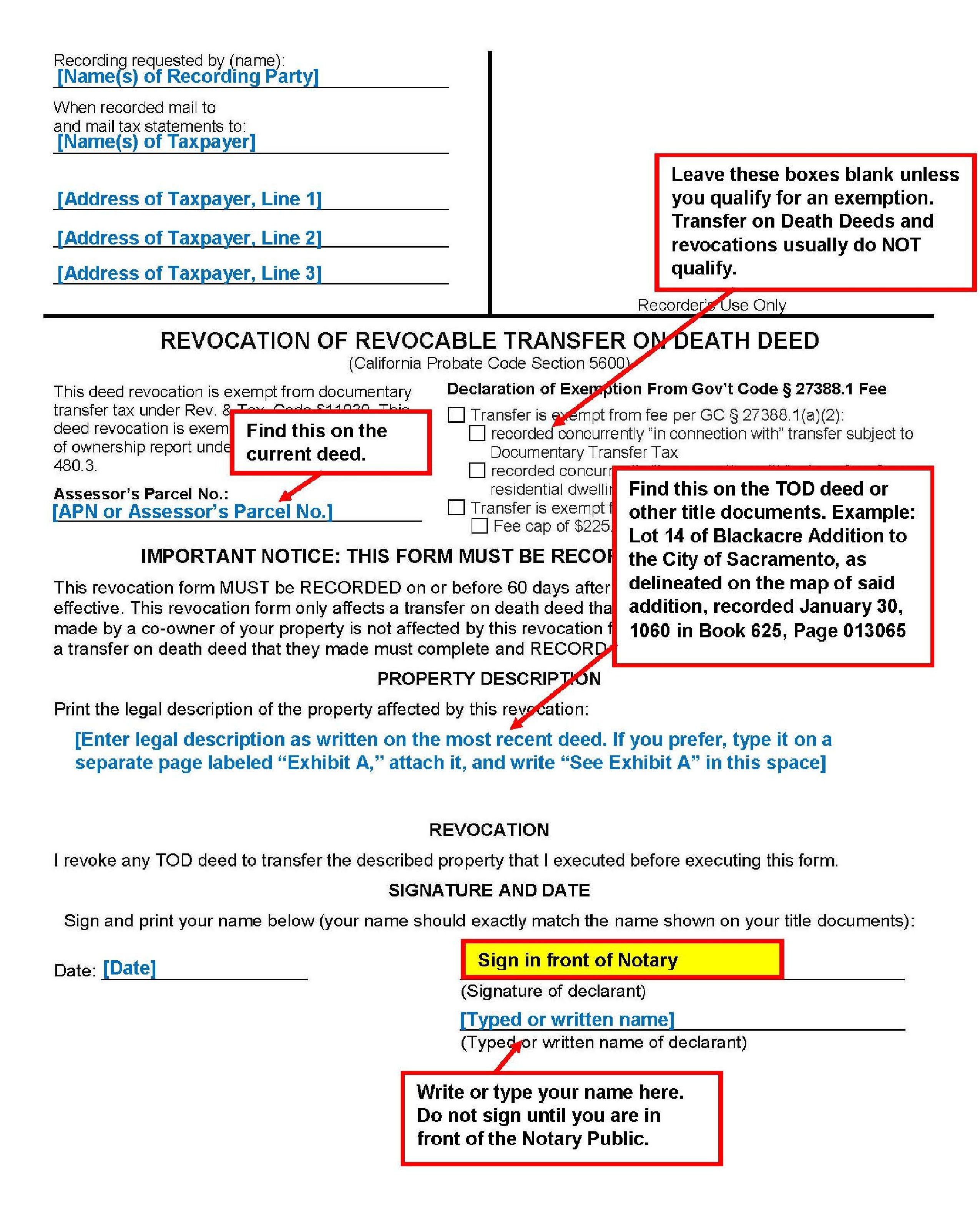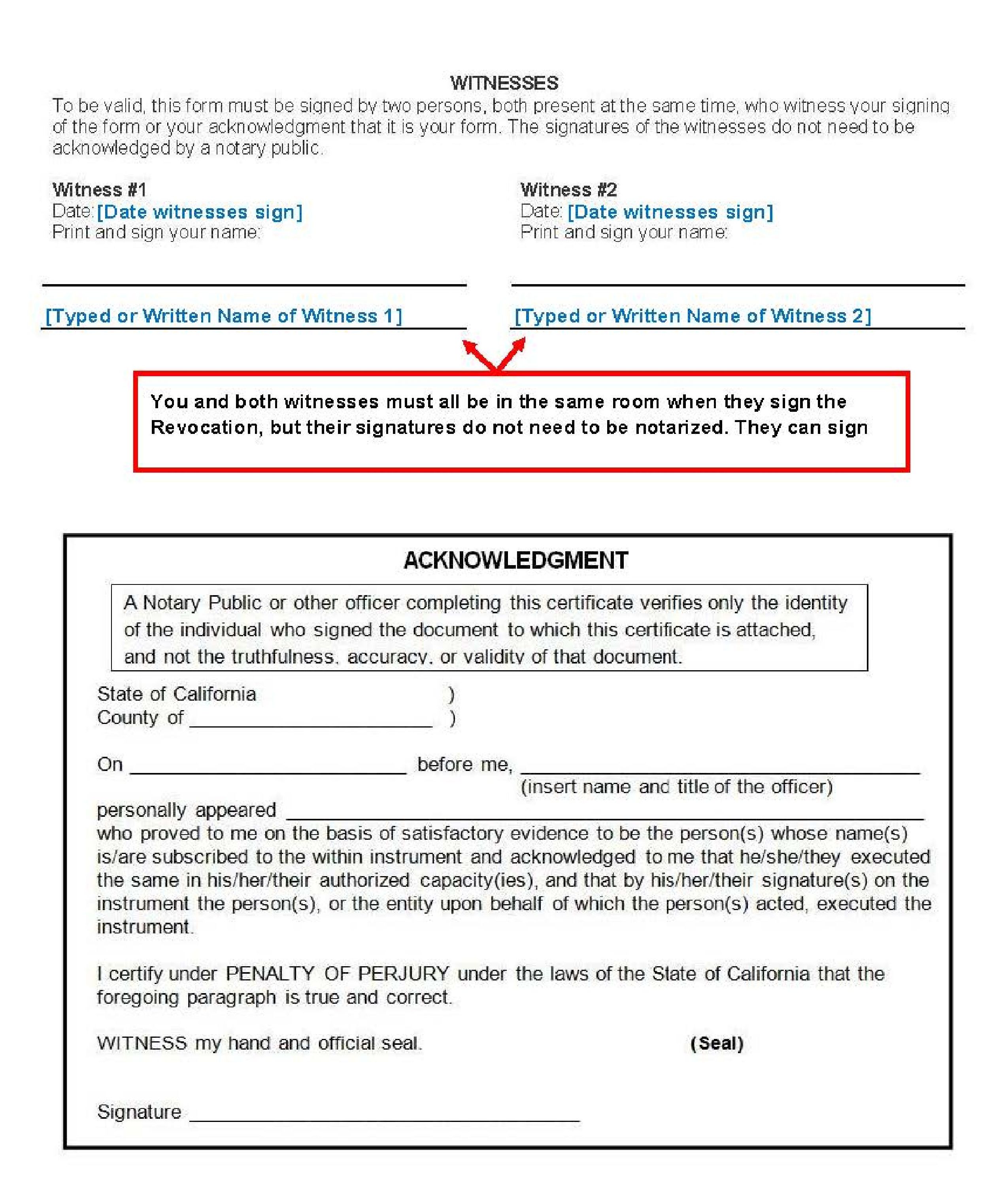Revoking Transfer on Death Deeds
The “Revocable Transfer on Death Deed,” also called “TOD Deed” or “beneficiary deed,” is a simple way to leave a residence to your beneficiaries without the need for probate. The current owner or “transferor” names the intended heirs as “beneficiaries.” The deed has no effect until the transferor dies, so you can change your mind at any time by recording a Revocation of Transfer on Death Deed.
As of Jan. 1, 2022, both TOD deeds and Revocations must be signed by two witnesses.
Templates and Forms
Steps to Revoke your TOD Deed
You can revoke a TOD deed at any time for any reason. If you sell the property, the deed is automatically revoked. To revoke it without selling it, fill out and record a “Revocation of Revocable Transfer on Death (TOD) Deed.”
Download the “Revocation of Revocable Transfer on Death (TOD) Deed” form from the link above.
1
Locate your TOD Deed for the Property
You will need information from your TOD deed to complete Step 2.
If you do not have a copy of your TOD deed, you can purchase one from the Recorder’s Office. In Sacramento, this costs $1 per page. You can contact the Sacramento office at (916) 874-6334 or visit one of the office locations (see the Sacramento County Clerk/Recorder’s website for addresses and more information).
2
Fill Out the TOD Revocation (Do Not Sign)
The revocation can be typed, filled out online then printed, or neatly handwritten in dark blue or black ink. You will need the following information from the TOD deed:
- Assessor’s Parcel Number.
- The legal description of the property. This must match the TOD deed exactly. Attach the legal description as an exhibit if it is too long for the page.
- Your name as spelled on the TOD deed.
- The date you signed the TOD deed, the date you recorded the TOD deed, and the book/reel and page/image numbers stamped on the upper right of the TOD deed. (If your county uses instrument numbers, you will need that number. Sacramento County now uses instrument numbers, but used book and page numbers in the past. Copy whichever is on your TOD deed.
- Names of “beneficiaries” (your intended heirs), and their relationship to you, as written on your TOD deed.
A sample completed “Revocation of Revocable Transfer on Death (TOD) Deed” with more detailed instructions is available at the end of this guide.
3
Sign in Front of a Notary; Have Two Witnesses Sign
You will need to sign the Revocation in front of a notary. The notary will charge a fee for this service. You can find notaries at many banks, mailing services, and title companies.
Two witnesses need to sign. Their signatures do not need to be notarized. They must either witness you signing, or witness you acknowledging the form. (In other words, you must tell them, in person, what the form is and that you have signed it.)
4
Record the Revocation at the Recorder’s Office within 60 Days of Notarizing It
You must record a TOD Deed Revocation within 60 days of notarizing it or it becomes invalid. This is the easiest way for TOD Deed Revocations to fail.
Record the Revocation in the county where the property is located. The Recorder’s Office charges a recording fee and additional fees as set by state law. Current Sacramento fees are available at the County Clerk/Recorder’s website.
For help
Senior Legal Hotline
Toll Free: (800) 222-1753; Sacramento County: (916) 551-2140
Legal Services of Northern California
Free legal assistance for Sacramento residents age 60 and over on almost any civil issue, including property transfers and deeds.
Capitol Pro Bono
916-551-2102
Free estate planning assistance for low-income residents.
For More Information
On the Web:
California Advocates for Nursing Home Reform (CANHR)
“Transferring Your Home with a Transfer on Death Deed (TOD) – What You Need to Know”
Links several resources discussing advantages and disadvantages of TOD deeds, including a webinar for estate planning attorneys. CANHR also has a referral service to help you find attorneys specializing in elder law.
At the Law Library:
California Estate Planning (KFC 195 .A16 C3)
This book, published by CEB, discusses TOD deeds some of their tax and other implications, and possible alternatives in chapter 7.
Electronic Access: On the Law Library’s computers, using OnLaw.
Samples
Revocation of Revocable Transfer on Death (TOD) Deed


This material is intended as general information only. Your case may have factors requiring different procedures or forms. The information and instructions are provided for use in the Sacramento County Superior Court. Please keep in mind that each court may have different requirements. If you need further assistance consult a lawyer.




